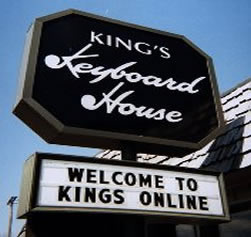King's Keyboard House

"Teach somebody to play, and they'll buy."
--Jim King--
The King family has always emphasized music education and maintaining strong relationships with teachers as part of their store policy. In fact, Richard King left Grinnel's Pianos because there, teachers were underappreciated. He opened up King's Keyboard House in 1961, after obtaining a masters in music theory from the University of Michigan, teaching piano lessons from his home, and gaining a decade of experience at Grinnell's Pianos in Ypsilanti, both selling pianos and managing the store. The first location was on Liberty Street, where Afternoon Delight now is (see map).
At first, Mr.
King recalls, things were hard. He didn't have a lot of business or
accounting skills, and while he had a decade of experience from Grinnell's, "not
everything I learned was good." He
started out with just three pianos and three electric organs, and business was
slow until
For Mr.
King, the hardest part about opening up his store was simply "surviving….keeping
the doors open." There were six
other piano stores in
When the store first opened, the clientele was mostly parents. "Teachers didn't know me yet," he says. But that would soon change.
For Mr. King, contributing to the music community was the most rewarding part of
opening up his own business. "I had
a good relationship with most of the teachers, and I felt that that was pretty
important—a necessity, actually—and that's something that Grinnell's could care
less about. And that's one thing I
learned from them, that teachers are your best friends, if you let them be." He was also certain to establish
relationships with educational institutions such as the
Customer satisfaction is another important goal of the King Family. "Dick doesn't want a piano to go out of this store unless it's near perfect," says long-time friend Tom Hill. "He wants to exceed customers' expectations." Today, Jim King carries on the concern for customers: "We'd rather lose money on a sale than have a customer unhappy," Jim says.
In addition to taking music lessons of all sorts, some of the King's seven children worked in the store. Russ, the oldest, was the first child to work for his father, and also worked next door for a fur dealer. Both Jim and Rob remember cleaning the store on Saturdays, and Julie worked behind the counter as a teenager. Patricia didn't have much time to help out in the store (with seven kids at home) until all of the children had grown up; even then, she only worked there for about two years to help with the books.
In 1968,
King's Keyboard House moved to
Meanwhile,
in 1983, the Kings opened a store in
In 2006, as Patricia and Richard were celebrating their 60th wedding anniversary, Richard King decided to retire. He left the store to two of his children, Jim and Julie. Jim King runs the store, while Julie King runs her newly opened sheet music store down the road.
As for the future of the family business? Jim doesn't think that Alex has any interest in taking over King's Keyboard House (he doesn't) but still has high hopes: "I'd love to keep it in the family. I really would. And I hope so. That's all I can say. I really hope that he does." Top